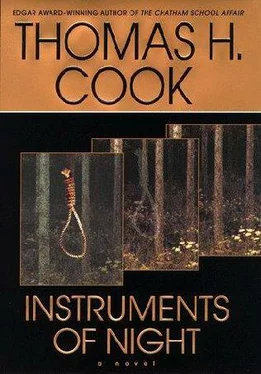Thomas Cook - Instruments of Night
Здесь есть возможность читать онлайн «Thomas Cook - Instruments of Night» весь текст электронной книги совершенно бесплатно (целиком полную версию без сокращений). В некоторых случаях можно слушать аудио, скачать через торрент в формате fb2 и присутствует краткое содержание. Жанр: Триллер, на английском языке. Описание произведения, (предисловие) а так же отзывы посетителей доступны на портале библиотеки ЛибКат.
- Название:Instruments of Night
- Автор:
- Жанр:
- Год:неизвестен
- ISBN:нет данных
- Рейтинг книги:3 / 5. Голосов: 1
-
Избранное:Добавить в избранное
- Отзывы:
-
Ваша оценка:
- 60
- 1
- 2
- 3
- 4
- 5
Instruments of Night: краткое содержание, описание и аннотация
Предлагаем к чтению аннотацию, описание, краткое содержание или предисловие (зависит от того, что написал сам автор книги «Instruments of Night»). Если вы не нашли необходимую информацию о книге — напишите в комментариях, мы постараемся отыскать её.
Instruments of Night — читать онлайн бесплатно полную книгу (весь текст) целиком
Ниже представлен текст книги, разбитый по страницам. Система сохранения места последней прочитанной страницы, позволяет с удобством читать онлайн бесплатно книгу «Instruments of Night», без необходимости каждый раз заново искать на чём Вы остановились. Поставьте закладку, и сможете в любой момент перейти на страницу, на которой закончили чтение.
Интервал:
Закладка:
The past still surrounded Graves like humid summer air. He realized he did not know exactly how long he’d been waiting on the bench. Rising, he glanced at his watch. He was relieved to discover that it had been only a few minutes.
“Riverwood isn’t far,” Saunders told him. “Just a short ride. The car’s over here. You don’t have any bags?”
Graves patted the small traveling case that hung from his arm. “Just this one.”
“This way, then,” Saunders said. They walked half a block to a dark blue Volvo station wagon.
“Riverwood’s a nice place, Mr. Graves,” Saunders said as he casually guided the car through the short main street of Britanny Falls. “With a big lake for swimming and rowing. All the summer guests have their own cottages, you know. So you’ll have a lot of privacy.”
“I’m just here for the weekend,” Graves told him. “I haven’t been invited for the summer.”
“So that accounts for the lack of luggage,” Saunders said as if it were a small question that had been gnawing at him. “Well, however long you stay, I’m sure you’ll enjoy yourself. Everybody does.”
The car continued down the road, the woods thickening, a dense undergrowth spreading across its shaded ground. From time to time Graves spotted hikers as they made their way along a narrow trail. Each time, he turned away and focused his attention on the road ahead, not wanting to conjure up the things such people sometimes came upon in their lonely forest rambles.
“Did they send you any information about Riverwood?” Saunders asked.
“Yes.”
“So you know its history? I don’t need to go into that?”
“No, you don’t,” Graves told him, instantly recalling the major points, how the Colony had been founded in the early 1960s, cottages added to the manor house and vast grounds of an estate that had once been the summer home of Warren Davies, but now accommodated the various artists, writers, and thinkers to whom his daughter, Allison, the current owner, saw fit to extend her hospitality.
“All kinds of people come to Riverwood for the summer,” Saunders said. “Writers. Poets. Playwrights.”
Graves could not imagine himself among such people, chatting confidently, easily holding forth while others listened attentively to whatever he might say. He thought of his apartment, its modest furnishings, spare as a monk’s cell, the only voice his own, a whispering in his mind.
They arrived at a broad green pond, then circled it, moving past a line of small wooden cottages, all of them empty, deserted, with nothing but the neatly tended lawns to give the impression they’d ever been occupied at all.
About halfway around the pond, Graves saw the main house rise in the distance. It rested on a gentle incline that swept up from the water.
“That’s where Miss Davies lives,” Saunders told him.
The big house had wide steps and high white columns, and from the booklet he’d received about Riverwood, Graves recognized it as the architectural centerpiece of the estate. The mansion had been built in the years just preceding the Depression, and in every way it seemed to suggest its own invulnerability to such cyclical catastrophes. A spacious side porch looked down over the front lawn. A stream ran from the pond to a boathouse that was joined to the main house by a long covered shed.
“Mr. Davies had the channel dug just before the war,” Saunders explained. “It connects the pond to the boathouse, then goes all the way to the Hudson. You can’t see the river from here, but it’s only a couple hundred yards from the back of the house.” He smiled. “Nice idea, don’t you think?”
Graves nodded but said nothing as the Volvo continued on along the edge of the pond until it reached yet another wooden cottage, one that was slightly larger than the others, and somewhat set apart, though a second, more or less identical cottage was situated only a hundred yards or so away.
“This is your place,” Saunders said cheerfully. “Not exactly a five-star hotel, but nice enough. Come on in, I’ll show you around.”
The cottage was indeed very nice, rustic in a carefully manicured sort of way, with oak furniture that had been regularly oiled, checkered curtains, a scattering of furniture that included a small sofa, a few chairs, and a rolltop desk in the far corner, its top thrown open to reveal a complex of tiny drawers and slots.
“There’s a kitchen, but you won’t need it,” Saunders told him. “There’s a tray of cold cuts in the refrigerator. Tomorrow morning, someone will bring your breakfast.” He smiled. “Room service, you might call it.” He glanced at the small travel bag into which Graves had hastily packed his clothes and toiletries. “Is there anything else you need?”
“No, nothing,” Graves replied.
Saunders nodded. “Well, have a good evening, Mr. Graves,” he said crisply, then turned and walked back to the Volvo.
Left to himself, Graves walked through the cottage. In the adjoining bedroom he found a bureau with four drawers and a narrow closet. There was a gooseneck lamp on the right side of the bed, and a little table with a pen and writing pad on the left. Everything appeared well made, but decidedly plain and functional, as if purposely selected to provide ample accommodation without creating a distraction.
The kitchen had the usual appliances, and when he opened the refrigerator, Graves found a large silver tray spread with an array of meats, pickles, olives, all tightly sealed beneath plastic wrap. Several plastic food containers held potato salad and coleslaw; others, mustard, ketchup, mayonnaise. Breads-white, whole wheat, even pumpernickel-had been placed in a rectangular container on the shelf below. A bottle of white wine stood upright in the refrigerator door, surrounded by an assortment of beer, soda, mineral water. On the table, a bottle of red wine rested in a wicker basket.
It was a generous spread, but Graves wasn’t hungry and he never drank. And so he returned to the porch and sat down in one of the wooden rocking chairs he found there and vaguely wondered why he’d been invited to Riverwood in the first place. Certainly he was not the type of literary writer Saunders had mentioned as the estate’s usual guest. His books were void of any symbolic complexity. There was nothing in them academics would be likely to discuss. And as for being an intellectual, Graves had long ago realized that he did not think so much as brood.
But if Graves could not fathom why Allison Davies had invited him to Riverwood, neither could he clearly understand why he’d agreed to accept her invitation. He did not like to leave New York and very rarely did so. The countryside held more dread than charm. Meeting other writers meant nothing to him. Even his earlier yearning to be with other people had long ago withered. He no longer felt the aching loneliness that had sometimes plagued him in his youth. He was accustomed to living thinly, without connections, the sort of life that was, in Slovak’s phrase, “mere breath.” Because of all that, Graves suspected that the real reason he’d come to Riverwood was his need to think things through a final time, decide once and for all if it was time to stop it altogether, shut down the little engine that dreamed nothing but dark tales. He had never doubted that one day he would kill himself. He’d hung a metal bar across the narrow corridor that led from his bedroom, and bought the rope that now lay coiled in the top drawer of his dresser. He knew the chair he’d stand upon. And the name he’d utter with his final exhalation: Gwen.
A sentence slashed Graves’ mind: You took me to her, boy. A terrible alarm swept over him. He heard Gwen scream, felt the rope bite into his arms as he struggled to free himself, come to her aid. Then the scream died away just as it had that night, absorbed by fields and hollows, alerting none but owls and field mice, summoning no one who might put an end to pain.
Читать дальшеИнтервал:
Закладка:
Похожие книги на «Instruments of Night»
Представляем Вашему вниманию похожие книги на «Instruments of Night» списком для выбора. Мы отобрали схожую по названию и смыслу литературу в надежде предоставить читателям больше вариантов отыскать новые, интересные, ещё непрочитанные произведения.
Обсуждение, отзывы о книге «Instruments of Night» и просто собственные мнения читателей. Оставьте ваши комментарии, напишите, что Вы думаете о произведении, его смысле или главных героях. Укажите что конкретно понравилось, а что нет, и почему Вы так считаете.












